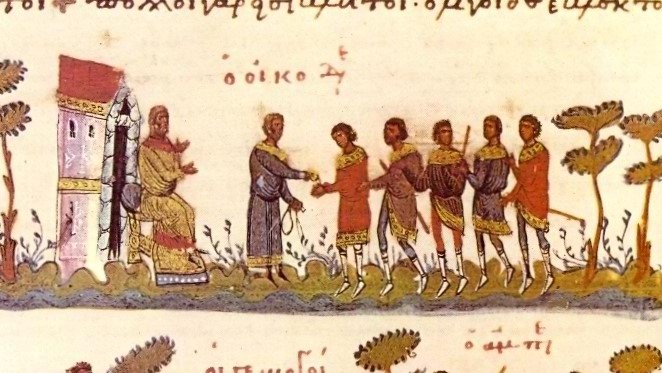
Matthew 20:1-16
Ordinary A43
1 “For the kingdomA of heavenB is like a landownerC who went out early in the morningD to hireE laborersF for his vineyard.G
2 After agreeingH with the laborers for the usual daily wage,I he sentJ them into his vineyard.
3 When he went out about nine o’clock,K he sawL othersM standingN idleO in the marketplace;P
4 and he said to them, ‘You also goQ into the vineyard, and I will payR you whatever is right.’S So they went.
5 When he went out again about noonT and about three o’clock, he did the same. 6 And about five o’clockU he went out and foundV others standing around; and he said to them, ‘Why are you standing here idle allW day?’
7 They said to him, ‘Because no one has hired us.’
He said to them, ‘You also go into the vineyard.’X
8 When evening came, the ownerY of the vineyard said to his manager,Z ‘CallAA the laborers and giveBB them their pay,CC beginning with the last and then going to the first.’ 9 When those hired about five o’clock came, each of them received the usual daily wage.
10 Now when the first came, they thoughtDD they would receive more; but each of them also received the usual daily wage. 11 And when they received it, they grumbledEE against the landowner, 12 saying, ‘These last worked only one hour, and you have made them equal to us who have borneFF the burdenGG of the day and the scorching heat.’HH
13 But he replied to one of them, ‘Friend,II I am doing you no wrong;JJ did you not agree with me for the usual daily wage? 14 Take what belongs to you and go; I chooseKK to give to this last the same as I give to you.
15 Am I not allowedLL to do what I choose with what belongs to me? Or are youMM enviousNN because I am generous?’OO 16 So the last will be first, and the first will be last.”PP
Image credit: “Parable of the Workers in the Vineyard” from the Byzantine Gospel of the 11th century.
